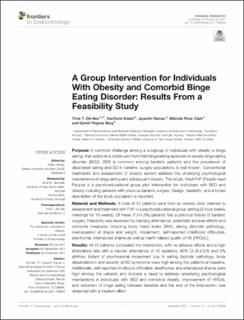| dc.description.abstract | Purpose: A common challenge among a subgroup of individuals with obesity is binge eating, that exists on a continuum from mild binge eating episodes to severe binge eating disorder (BED). BED is common among bariatric patients and the prevalence of disordered eating and ED in bariatric surgery populations is well known. Conventional treatments and assessment of obesity seldom address the underlying psychological mechanisms of binge eating and subsequent obesity. This study, titled PnP (People need People) is a psychoeducational group pilot intervention for individuals with BED and obesity including patients with previous bariatric surgery. Design, feasibility, and a broad description of the study population is reported. Material and Methods: A total of 42 patients were from an obesity clinic referred to assessment and treatment with PnP in a psychoeducational group setting (3-hour weekly meetings for 10 weeks). Of these, 6 (14.3%) patients had a previous history of bariatric surgery. Feasibility was assessed by tracking attendance, potentially adverse effects and outcome measures including body mass index (BMI), eating disorder pathology, overvaluation of shape and weight, impairment, self-reported childhood difficulties, alexithymia, internalized shame as well as health related quality of life (HRQoL). Results: All 42 patients completed the intervention, with no adverse effects and a high attendance rate with a median attendance of 10 sessions, 95% CI (8.9,9.6) and 0% attrition. Extent of psychosocial impairment due to eating disorder pathology, body dissatisfaction and severity of ED symptoms were high among the patients at baseline. Additionally, self-reported childhood difficulties, alexithymia, and internalized shame were high among the patients and indicate a need to address underlying psychological mechanisms in individuals with BED and comorbid obesity. Improvement of HRQoL and reduction of binge eating between baseline and the end of the intervention was observed with a medium effect Conclusion: This feasibility study supports PnP as a potential group psychoeducational intervention for patients living with BED and comorbid obesity. Assessments of BED and delivery of this intervention may optimize selection of candidates and bariatric outcomes. These preliminary results warrant further investigation via a randomized control trial (RCT) to examine the efficacy and effectiveness of PnP. | en_US |

